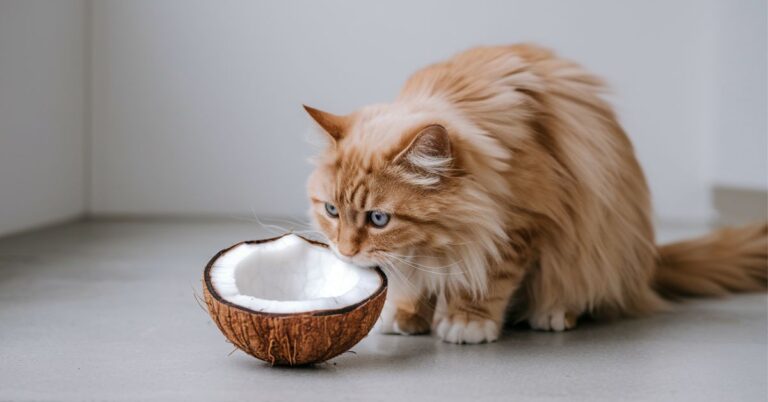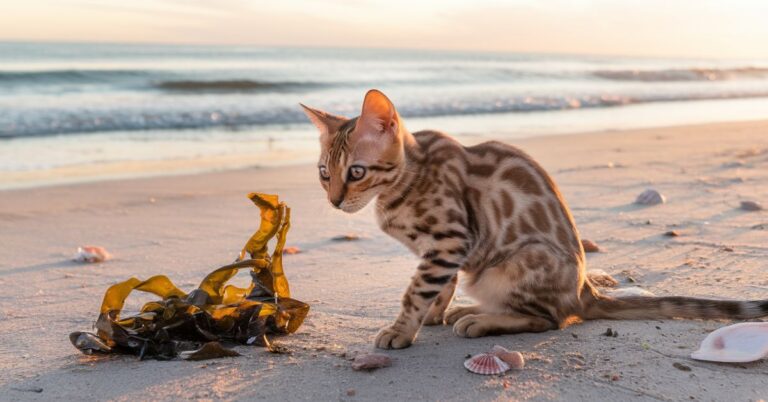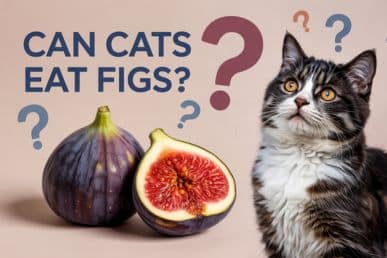Can Cats Eat Potatoes Safely? Avoid These Toxic Mistakes Now
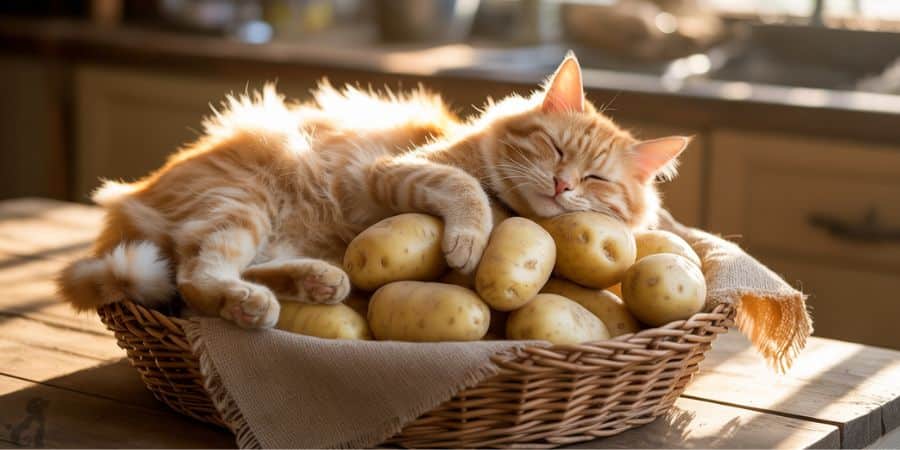
Ever wondered if your curious kitty can munch on that spud you’re prepping for dinner? Potatoes are a versatile veggie, popping up in main courses, side dishes, and even as afternoon snacks for humans.
But when it comes to cats, the answer isn’t so simple. While cooked potatoes aren’t toxic to most pets, they’re still not good for your feline friend’s diet.
Cats are meat-lovers by nature, and adding starchy foods like potatoes to their food bowl can upset their tiny tummies.
Plus, raw potatoes or green bits can be poisonous in some instances, much like cherries, which contain toxic pits and stems. Always know what’s safe before sharing your plate—your kitty relies on you to keep their meals healthy and yummy.
Safe vs. Unsafe Potato Types for Cats
Wondering “Can Cats Eat Potatoes Safely?” Here’s a quick guide to safe and unsafe types—but keep scrolling to learn why even ‘safe’ potatoes can harm your cat, what to do if they sneak a toxic bite, and vet-approved swaps to keep them healthy!”
| Type of Potato | Safe for Cats? |
|---|---|
| Raw potatoes (any form) | ❌ No |
| Baked potato (plain, skin removed) | ✅ Yes (tiny amounts) |
| Boiled potato (plain, skin removed) | ✅ Yes (tiny amounts) |
| Mashed potato (plain, no additives) | ✅ Yes (tiny amounts) |
| Mashed potatoes with butter/milk | ❌ No |
| Potato skins (cooked or raw) | ❌ No |
| Sweet potato (cooked, plain) | ✅ Yes (tiny amounts) |
| Sweet potato (raw) | ❌ No |
| Green potatoes (raw or cooked) | ❌ No |
| Potato chips/crisps | ❌ No |
| French fries | ❌ No |
Can Cats Have Potatoes?
Cats are obligate carnivores (meat-dependent by nature), meaning their bodies are built to thrive on animal proteins from meat, not carbohydrates.
While potatoes aren’t toxic to cats if properly prepared (cooked plain), they fall into the heavy-carb category and offer little nutrition. Cats struggle to digest carbs, so too much potato might upset their digestive system.
- Raw potatoes, potato skin, and various parts of the potato plant can be toxic to cats because they all contain solanine. Always keep these away from curious paws!
- Potatoes do not contain any specific calories for cats, which is why cats cannot meet their nutritional needs through potatoes. Stick to high-quality cat food instead.
Even if your cat sneaks a bite of cooked potato, it’s not dangerous. But since their bodies aren’t designed for carbs, it’s best to avoid making potatoes a regular snack.

Are Potatoes Good for Cats?
While potatoes aren’t harmful to cats if prepared properly, they’re not a must-have in their diet.
Cats need meat-based nutrients to stay healthy, and most commercial cat foods are already formulated with everything they require.
Potatoes do offer some nutritious benefits, like carbohydrates, but too much can lead to overweight cats or worsen a health condition like diabetes.
If you want to share human food like potatoes as a treat, keep it tiny, plain (no butter or spices!), and occasional.
Remember, potatoes shouldn’t replace the essential component of a cat’s meals—high-quality protein. Always check with a vet if your cat has special dietary needs!
Nutritional Value of Potatoes (100 grams):
| Nutrients | Amount per 100 grams |
|---|---|
| Protein | 2.2 grams |
| Fat | 0.1 grams |
| Carbohydrates | 15.4 grams |
| Sugar | 0.3 grams |
| Dietary fibre | 1.7 grams |
Health Benefits of Potatoes for Cats
Vitamins and Minerals In Potatoes
Potatoes pack a mix of vitamins and minerals that could benefit cats, but only in tiny, cooked bites! For example, vitamin B6 helps with healthy muscle function, while potassium keeps their nerves and muscles chatting smoothly.
Magnesium quietly supports bones, and iron plays a starring role in oxygen transport, making sure energy reaches every paw. Don’t forget vitamin C! This antioxidant hero shields their cells and boosts immune system health.
But here’s the catch: cats thrive on meat, not spuds. So, while potatoes have these goodies, they’re more of a “sometimes snack” than a menu staple.
For a nutrient-rich supplement that cats can enjoy more regularly, consider seaweed—it’s packed with iodine and vitamins that support thyroid health.
Provides Complex Carbohydrates
Potatoes can be a source of steady energy for cats because they contain complex carbs. These carbohydrates break down slowly in your cat’s body, giving them fuel that lasts longer instead of a quick sugar rush.
While cats don’t need carbs as much as humans, small amounts of cooked, plain potatoes (without skin) might be okay as an occasional treat.
- Potato skins are tricky—they’re high in fibre, which can help promote digestive health, but they’re hard for cats to digest. Always remove skins to avoid upsetting their stomachs!
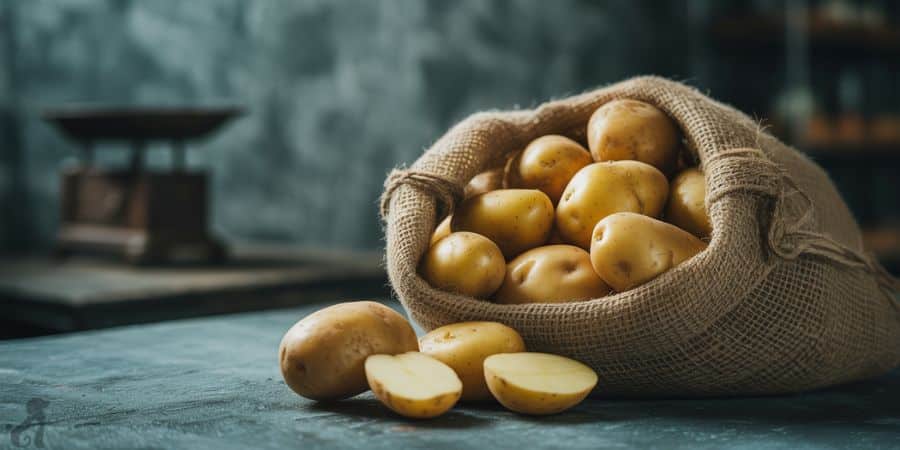
Potato Improves Digestive Health.
Cooked potatoes might surprise you! They contain fibre and resistant starch (a fibre-like starch), which acts like a prebiotic snack for your cat’s tummy.
These help feed the good bacteria in their gut microbiome, keeping their digestion smooth. Better absorption of nutrients means your furry friend gets more from their meals.
Just remember: always serve plain, mashed potatoes—no butter or seasoning!
Maintains Your Cat’s Healthy Weight
Did you know potatoes (yes, even white potatoes and sweet potatoes) might help your cat stay at a healthy weight?
These starchy vegetables have high-fibre content, which keeps your furry friend feeling full longer, so they snack less and avoid extra calories.
Some pet food brands mix in veggies like corn, peas, or parsnips for the same reason—just remember, moderation is key!
Which Types of Potatoes Can Cats Eat?
Can Cats Eat Raw Potatoes?
While cats might sneak a bite of your fries, raw potatoes are a big no-no for your kitty. The potato plant contains natural chemicals that are toxic to cats, especially in unripe spuds or those with green spots (a sign of solanine, which is harmful).
Even small parts of raw potatoes—like skins or chunks—should never be allowed in their diet. If your cat tries to eat them, it could lead to tummy troubles or worse.
Stick to cat-friendly treats and keep any raw potato scraps far from curious paws!
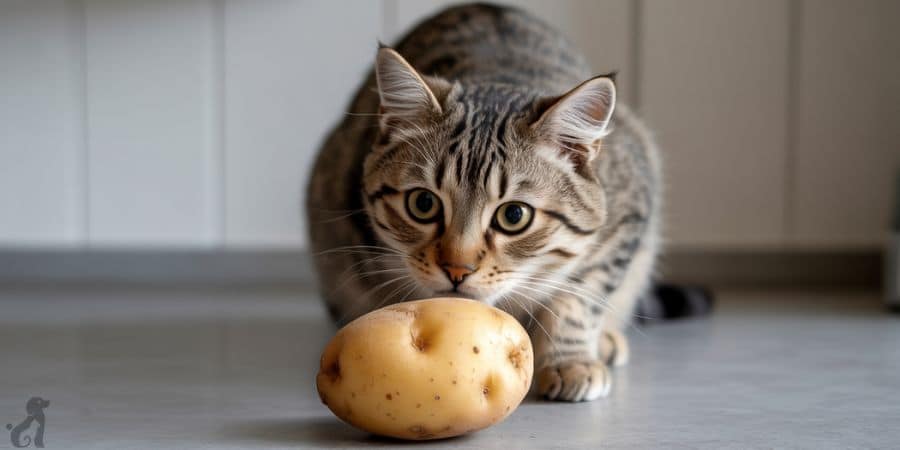
Case Study: Luna’s Raw Potato Curiosity
- Scenario: Luna, a 3-year-old tabby, nibbled on a raw potato peel left on the kitchen counter. Within hours, she vomited twice and became lethargic.
- Outcome: Her owner rushed her to the vet, where Luna was treated for solanine toxicity with IV fluids and anti-nausea medication. She recovered fully in 24 hours.
- Vet Advice: Raw potatoes and skins are dangerous—always store them out of reach. If ingestion occurs, seek immediate care, even for small amounts.
Can Cats Eat Baked Potatoes?
While baked potatoes might smell tempting to your kitty, it’s important to know what’s safe. The cooked potato itself (the soft inner portion) is okay for cats in small amounts, but never feed them the skin.
Potato skins can be hard to digest and might upset their stomach. If you share a tiny bite of the fluffy inside, make sure it’s plain—no butter, salt, or toppings!
Always let your cat enjoy treats like this sparingly, and never let them eat potato skins, even if they beg.
Can Cats Eat Boiled Potatoes?
Boiled Potatoes & Raw Potatoes contain solanine, a poisonous chemical harmful to cats. Cooking reduces solanine, making boiled safer—but never replace meat-based meals! Keep treats tiny, unseasoned, and rare.
Can Cats Eat Mashed Potatoes?
While mashed potatoes might seem harmless, the way they’re prepared matters for feline safety. Many recipes include salt, milk, butter, or spices, which aren’t safe for cats.
High sodium levels from added salt can lead to increased blood pressure, and certain spices might even cause poisoning in rare instances. Though tiny bites won’t always hurt, it’s best to avoid sharing this dish.
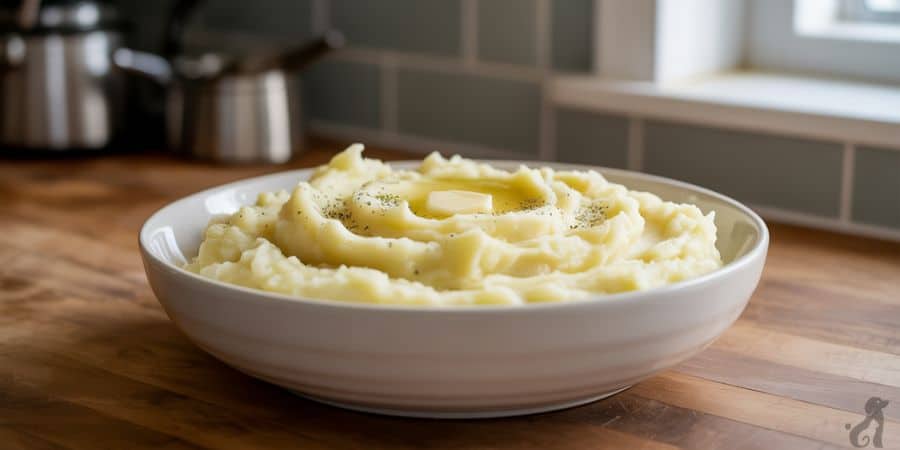
Another issue is that cats are often lactose intolerant, meaning dairy products like milk or cheese in mashed potatoes can cause digestive problems like stomachaches.
Even plain potatoes (without toppings) aren’t ideal for meals, as cats thrive on meat-based diets. Most vets agree: skip the spuds and stick to cat-friendly treats!
Can Cats Eat Potato Skins?
While potatoes (cooked plain) might be okay for cats in tiny amounts, potato skins are trickier. Raw potato skins contain solanine, a natural toxin that can harm cats.
Even when cooked, traces of this chemical might stay in the skin, so it’s safer to remove them before feeding potatoes to your pet. Here’s why potato skins should be avoided:
- Solanine can upset a cat’s stomach or cause serious health issues.
- If your cat eats a small piece accidentally, watch for vomiting or tiredness.
- Always talk to your vet before sharing human foods like potatoes.
Stick to cat-friendly treats—potato skins aren’t worth the risk!
Can Cats Eat Sweet Potatoes?
Sweet potatoes are non-toxic to cats, unlike regular potatoes, which contain solanine, a toxic compound in raw potatoes, green parts, and sprouts.
Cooking regular potatoes makes them safer, but they’re still starchy and carb-heavy, which could lead to obesity or blood sugar problems. Sweet potatoes are slightly better, but they’re still loaded with empty calories and can cause digestive issues if overfed.
If you offer either type of potato, stick to plain, cooked potatoes (never raw!) and keep portions very small. Think of it like sharing a tiny bite of your meal—too much isn’t healthy for your furry friend!
Can Cats Eat Potato Crisps or Chips?
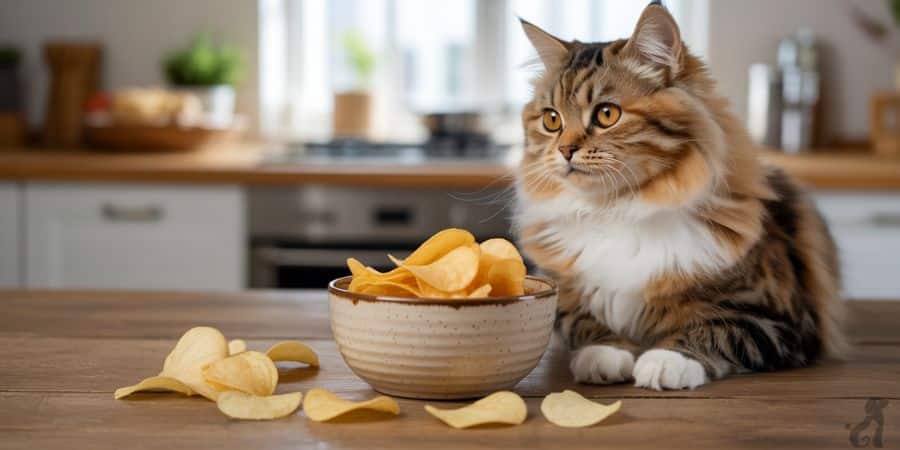
While cats might stare at your potato chips, fries, or crisps with those cute eyes, these human snacks aren’t safe for them.
Most fried or oven-baked potato snacks are loaded with salty seasonings and fatty oils, which can upset their feline digestion. Even small amounts might cause vomiting or diarrhea.
Avoid sharing these treats! High salt can lead to serious health problems, like dehydration. If your pet ever sneaks a bite, look out for signs like laziness or refusing food.
Call your vet for advice immediately if you suspect they’re unwell. Remember, cats shouldn’t eat these snacks—no matter how they beg with those paws!
Can Cats Eat French Fries?
While French fries might look tempting to share, they’re not a safe snack for your feline friend. These crispy treats are fatty and salty, which can upset your cat’s tummy or even make them sick.
Cats thrive on protein-rich foods, and fries offer minimal nutrition that they actually need. A tiny nibble won’t always cause harm, but it’s better to stick to cat-friendly treats to keep them healthy!
How Can Cats Eat Potatoes?
Preparation Steps:
If you’re sharing a tiny bit of potatoes with your cat, wash them thoroughly first—dirt isn’t tasty! I learned this the hard way when my cat sniffed a muddy spud and walked off.
Next, remove any roots, green areas, or discolored areas—those spots contain solanine, which is toxic. Always peel the skin (cats digest it poorly) and cut the potato into small pieces (like into ½-inch cubes) to avoid choking.
Offer only tiny amounts—a small taste once or twice per week.
Here’s how I prep it safely:
- Roast the pieces plain—no salt or fats! Cats don’t need seasoning.
- Let it cool completely. My cat, Whiskers, prefers room-temperature bites.
Feeding Guidelines:
If you’re sharing a small potato piece with your cat, keep it simple! Always mash or cook the potato until soft, let it cool down, and offer a bite-sized piece (think pea-sized) as a first-time test.
Stick to a small amount—like a tiny spoonful—to avoid an upset stomach. After feeding, pay attention to your cat’s reaction: if you notice vomiting or diarrhea, call a vet immediately. Remember, even safe foods can surprise us!
My Cat Ate Potatoes. What should I do now?
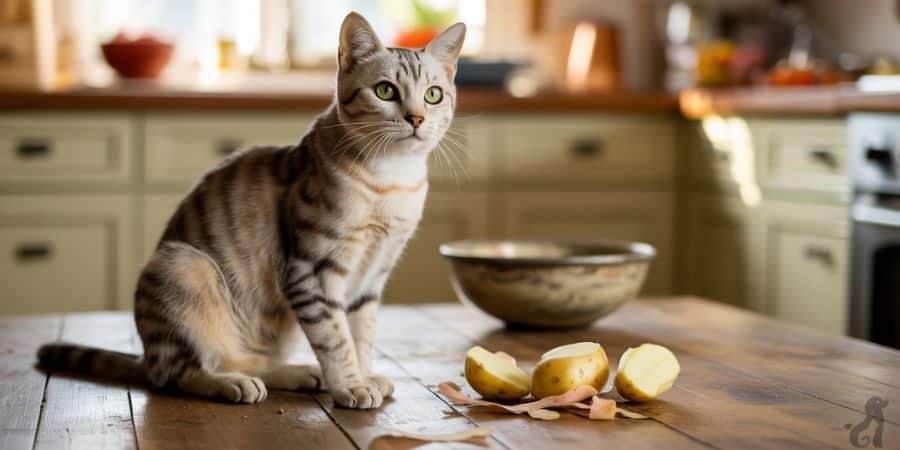
If your kitty nibbled on potato skin or raw potato, stay calm but act quickly. Raw potatoes contain solanine, a toxin that can cause gastrointestinal problems like nausea, vomiting, or diarrhea.
In severe cases, it might lead to neurological signs such as tremors, seizures, or even loss of consciousness. First, check how much your cat has eaten. If they had even a small bite of raw potato or its skin, contact your veterinarian right away.
For cooked potatoes (plain, no butter or salt!), the risk is lower, but still watch for tummy troubles. Symptoms can range from mild to serious, so don’t wait. Your vet will guide you on the next steps to keep your furry friend safe!
Other Healthy Foods for Cats Besides Potatoes
Cats need nutritious meals made just for them, not scraps from your plate! While you might want to share your snacks, human foods often don’t meet their dietary standards.
Instead, focus on lean, cooked meats like chicken, turkey, or beef—always plain (no seasoning!). These are safer and healthier options.✅
For a special treat, try tiny portions of fish like tuna, haddock, or salmon. Even shrimp can work, but keep it small and occasional. Remember:
- Prepared meats should never replace well-balanced cat food.
- Treats shouldn’t exceed 10% of their total daily calories.
Stick to high-quality cat food as the main food your cat eats. It’s prepared to give them all the nutrients they need without risking their health.
Still curious about “Can Cats Eat Potatoes or not?”. Watch the video below to find the answer to this question according to your preference.
Conclusion:
So, Can Cats Eat Potatoes? Here’s what I’ve learned after my own cat, Mochi, tried stealing a fry from my plate:
- Cooked potato (no skin or seasoning!) is okay as a rare treat, but it’s just empty calories—your kitty needs meat, not starchy veggies.
- Never feed raw potatoes or skins—they’re loaded with solanine, a toxic compound that can make cats seriously sick.
- Even sweet potatoes, though non-toxic, are too carb-heavy and might upset their stomach.
Cats thrive on pet food made for them, not human snacks. If your sneaky furball nabs a tiny bite of plain boiled potato, don’t panic—just keep it rare and remove the skins. Always talk to your vet if you’re worried.
Frequently Asked Questions:
Can I give a boiled potato to my cat?
Cats can eat plain cooked potatoes in tiny amounts, but avoid adding toppings like butter or sauces. Seasonings such as salt, onion, or garlic are highly poisonous to cats and must never be mixed into their food. Even a small serving with these ingredients can be harmful. Always keep potatoes plain—no extras!
Can Cats Eat Potato Salad?
While potato salad might seem harmless, cats should avoid it. Many ingredients like onions, garlic, and shallots (part of the Allium vegetables) are toxic to felines. These can be poisonous, causing serious harm. Even small amounts are a no-no! Plus, potato salad contains mayo or spices, highly unsafe for your furry friend.
Are cooked potatoes okay for cats?
Cats can eat cooked, plain potatoes in small amounts, but be careful! Mashed potatoes might seem safe, but the ingredients used (like butter or salt) can be harmful. Too much potato causes a risk of gastroenteritis—a condition with inflammation in the stomach and intestines. Symptoms like vomiting or diarrhea might happen. Always keep potatoes plain and never put extras like spices. Remember, potatoes should only be eaten as a tiny treat, not a meal!
Why do cats love potatoes?
Cats are curious about the foods humans eat, especially mashed potatoes! The novelty of seeing you enjoying them might make your cat want to try. Mashed potatoes often contain butter or cream, which have fat content that cats find appealing. While high-fat foods can seem tasty, cats are simply attracted to smells and textures, not because potatoes are good for them!
Why is a potato included in cat food?
Potatoes are sometimes added to wet or dry cat food as a source of grain-free carbohydrates. They provide energy and minerals that support a cat’s diet. Veterinarians often recommend keeping them in small amounts (around 1 to 2%) to avoid upsetting your cats’ stomachs. When used as an additive, potatoes are fine if part of a balanced diet.
Can kittens eat potatoes?
Kittens should not eat potatoes. If you choose potatoes to meet their nutritional needs, it is a very unnecessary and dangerous choice. Stick to high-quality kitten food or vet-approved treats.


